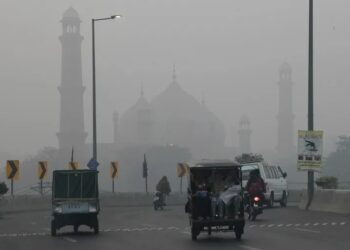Written by: Abdul Basit Alvi
Terrorism has posed one of the most significant challenges to Pakistan for many decades. The country has endured a complex and tumultuous history of violence and extremism. Today, terrorism continues to jeopardize national security, disrupt social unity, and hinder economic progress.
The origins of terrorism in Pakistan can be traced to its involvement in the Soviet-Afghan War in the 1980s. As a key ally of the United States and its partners in combating the Soviet invasion of Afghanistan, Pakistan played a central role. With assistance from the CIA and its own intelligence agency, the ISI, Pakistan facilitated the training and arming of Afghan mujahideen fighters. After the Soviet withdrawal in 1989, the conflict left behind a network of armed militants who found refuge in Pakistan’s tribal areas. The 1990s saw rising domestic instability, including political upheaval, economic challenges, and a surge in religious extremism. The networks formed during the Afghan conflict began to turn inward, fueling the spread of radicalism within Pakistan.
The post-9/11 period marked a critical shift in Pakistan’s experience with terrorism. After the 2001 attacks in the United States, Pakistan became a frontline state in the global War on Terror. Under General Pervez Musharraf, the Pakistani government aligned with the U.S. to combat terrorism, leading to increased tensions with militant groups. Various terrorist organizations emerged, many of them based in the tribal regions along Pakistan’s border with Afghanistan. In 2007, the Tehrik-i-Taliban Pakistan (TTP), a coalition of militant factions, was formed with the aim of imposing a strict interpretation of Sharia law. The TTP was responsible for numerous high-profile attacks and benefited from Pakistan’s porous border with Afghanistan, which allowed militants to easily organize and operate. Furthermore, the lack of effective governance in regions like the Federally Administered Tribal Areas (FATA) provided militants with safe havens.
Pakistan’s relations with neighboring Afghanistan have been tense, and its strategic partnership with China has added further complexity to its security concerns. The China-Pakistan Economic Corridor (CPEC), a major infrastructure project, has faced threats from militant groups opposing Chinese influence in the region, resulting in attacks on Chinese nationals working in Pakistan, particularly in Balochistan.
The human cost of terrorism in Pakistan has been catastrophic. Thousands of lives have been lost to bombings, targeted killings, and suicide attacks carried out by militants. The TTP has specifically targeted civilians, law enforcement, and military personnel, and large-scale attacks on mosques, markets, and public spaces have created widespread fear. The conflict has also displaced millions of people due to ongoing military operations in areas controlled by militants. This situation has strained the country’s resources and placed immense pressure on its economy.
The term Fitna al-Khwarij has historical roots dating back to the early Islamic period, referring to a group of dissenters who rebelled against the established Muslim leadership in the 7th century, particularly during the First Fitna, a civil war within the early Muslim community. The Khwarij (or Kharijites) believed that any Muslim, regardless of lineage, could lead the community, provided they adhered strictly to Islamic principles. They became infamous for their radical ideology, rejecting political and theological compromise, and for resorting to violence to achieve their goals. Although the original Khwarij group was defeated in the early years of Islamic history, their ideology has endured over time, frequently resurfacing in extremist movements that reject the authority of established Muslim rulers and resort to violent methods to impose their interpretation of Islam. In recent years, factions influenced by Khwarij ideology have become a growing concern in Pakistan, a country grappling with increasing levels of religious extremism and terrorism. The Khwarij were known for their rigid interpretation of Islam and their willingness to use violence to further their objectives. The Khwarij justified their actions by labeling those who disagreed with their beliefs as apostates. Their extreme approach to religious purity and political dissent laid the groundwork for future extremist ideologies.
Since its creation in 1947, Pakistan has faced numerous challenges related to political instability, sectarianism, and militancy. The rise of radical Islamic ideologies in the 1980s and 1990s, particularly during and after the Soviet-Afghan War (1979-1989), provided a fertile environment for extremist movements, including those influenced by Khwarij ideology. In Pakistan, this ideology primarily manifests through militant groups that reject the legitimacy of the state and its rulers, engage in violent jihad (holy war), and seek to establish a theocratic state based on their interpretation of Islam.
While the original Khwarij group was defeated in the 7th century, modern groups inspired by their beliefs have continued to emerge, often challenging the state’s authority and committing acts of terrorism in the name of Islam. Several militant organizations in Pakistan draw inspiration from the Khwarij, either in their strict interpretation of Islam or in their readiness to use violence to pursue political objectives. One of the most notable groups linked to Khwarij ideology is the Tehrik-i-Taliban Pakistan (TTP), also known as the Pakistani Taliban. Formed in 2007, the TTP is a coalition of various militant factions aiming to impose a strict interpretation of Sharia law across Pakistan. The TTP’s refusal to negotiate with the Pakistani government, its violent tactics, and its assertion that the Pakistani state is un-Islamic reflect the principles of the Khwarij. The group has carried out numerous attacks on security forces, civilians, and government installations, resulting in thousands of deaths.
The TTP’s ideology is rooted in a radical interpretation Islam that rejects the legitimacy of the Pakistani state, its leaders, and its laws. This uncompromising stance mirrors the original Khwarij, who viewed any compromise with rulers as apostasy. The rise of Khwarij-inspired groups in Pakistan has had a profound impact on the country’s security, social fabric, and political landscape. Pakistan has faced a relentless wave of attacks from militant groups adhering to Khwarij-like ideologies. Suicide bombings, assassinations, and assaults on schools, mosques, and markets have become frequent, resulting in the loss of thousands of innocent lives. The TTP, in particular, has been responsible for some of the deadliest attacks.
Groups influenced by Khwarij thought often target minority religious communities, whom they deem out of faith. Sectarian violence has escalated in various regions of Pakistan, with militant groups orchestrating attacks on religious processions, mosques, and individuals. This violence has deepened sectarian divisions and endangered the country’s social cohesion. Pakistan’s tribal areas, especially in North and South Waziristan, have long served as sanctuaries for militants, including those influenced by Khwarij ideology. The absence of effective governance, along with historical marginalization, has made these regions ideal breeding grounds for extremist groups. A defining characteristic of Khwarij-inspired groups is their rejection of the state’s legitimacy. These groups refuse to recognize the Pakistani government or its institutions, often calling for the establishment of a caliphate based on their interpretation of Islamic law. This ideology erodes the authority of the state and challenges the political and legal framework, making governance more challenging. In Pakistan, groups inspired by Khwarij ideology, such as Tehreek-e-Taliban Pakistan (TTP), ISIS, and others, have carried out numerous deadly terrorist attacks. These attacks have targeted civilians, security forces, government institutions, and religious minorities, leading to widespread fear and instability. Although not directly carried out by a Khwarij group, the assassination of former Prime Minister Benazir Bhutto on December 27, 2007, is often linked to extremist factions that hold radical ideologies similar to those of the Khwarij. Bhutto’s leadership and political views were seen as a threat by many extremists who opposed her vision of an Islamic state. The attack occurred during a rally in Rawalpindi, when a gunman shot and killed Bhutto, followed by a suicide bombing that killed dozens of her supporters. The Taliban, especially the TTP, claimed responsibility for the assassination, stating it was retaliation for Bhutto’s secular stance and her alleged ties to the West. Although the TTP’s ideology is more complex and cannot be solely classified as Khwarij-inspired, their rejection of political compromise and use of violence to impose their interpretation of Islam echoes the Khwarij legacy of rejecting established authority and leadership.
On March 3, 2009, a group of militants, reportedly linked to the TTP, ambushed the Sri Lankan national cricket team’s bus in Lahore. The attack killed six Pakistani police officers and wounded several players. The TTP took responsibility, citing their desire to target Pakistani government forces, whom they viewed as complicit in the fight against Afghan Taliban insurgents. The timing and execution of the attack underscored the growing violence driven by groups influenced by Khwarij-like ideologies, aiming to destabilize Pakistan by attacking its civilian and national institutions.
One of the most devastating terrorist incidents in Pakistan’s modern history occurred on December 16, 2014, when seven gunmen affiliated with the TTP stormed the Army Public School in Peshawar, killing at least 141 people, including 132 children. The attackers specifically targeted students and teachers, many of whom were the children of military personnel, in retaliation for Pakistan’s military operations in North Waziristan against the TTP. This horrific massacre mirrored the Khwarij-like approach of targeting innocent civilians and children to send a political message. The TTP’s uncompromising ideology, which rejects any form of compromise with the state, is reminiscent of the Khwarij’s original violent actions against those they considered enemies of their religious cause. The attack shocked Pakistan and spurred the nation’s efforts to combat terrorism.
On August 8, 2016, a suicide bomber targeted a gathering of lawyers at the Civil Hospital in Quetta, Balochistan, killing at least 70 people and injuring more than 100. The bombing was followed by a second suicide bombing that targeted rescuers and bystanders. ISIS claimed responsibility, reflecting their radical ideology, which shares many similarities with the Khwarij, particularly in terms of their strict interpretations of Islam and rejection of authority. This attack, along with many others attributed to ISIS and its affiliates, highlights the spread of Khwarij-inspired ideology in Pakistan. ISIS has taken responsibility for several attacks across the country, targeting civilians, military institutions, and religious minorities.
On March 15, 2017, ISIS carried out a suicide bombing at the Church of St. John in Lahore, targeting the Christian community. The attack killed at least 15 people and injured over 70, and was part of ISIS’s broader campaign against religious minorities in Pakistan. This attack exemplifies the Khwarij-inspired ideology of targeting religious minorities, whom extremist groups often view as heretics or apostates. The Khwarij historically justified violence against those who did not adhere to their interpretation of Islam. In modern times, this ideology has fueled attacks on Pakistan’s Christian and other minority communities. On July 13, 2018, a suicide bombing occurred in Mastung, Balochistan, during a campaign rally for local political candidate Siraj Raisani. At least 150 people were killed, including the candidate, and many others were injured. ISIS claimed responsibility for the bombing, justifying it as a strike against those they considered enemies of Islam. The attack targeted both political leaders and civilians, highlighting how groups influenced by Khwarij ideologies often focus on those they consider “apostates” or “enemies” of their radical interpretation of Islam. The assault on a political rally exemplified the Khwarij rejection of any form of political legitimacy or compromise. On January 30, 2020, a suicide bomber detonated explosives inside an Imam Barra in Peshawar, killing at least 15 people and injuring many more. The attack was attributed to a faction of the TTP and was part of a broader wave of violence against a sect of Muslims in Pakistan, who are frequently targeted by extremist groups that view them as apostates. The Khwarij’s early ideology was marked by sectarian violence, which has continued in modern times, manifested in attacks on religious minorities in Pakistan. The Peshawar mosque bombing serves as a stark reminder of the ongoing threat of sectarian violence fueled by Khwarij-inspired extremism.
On June 29, 2020, four gunmen attacked the Pakistan Stock Exchange building in Karachi, killing at least four security guards and two policemen. The attackers were killed by security forces, but the assault underscored the persistent threat of terrorism posed by militant groups with ties to Khwarij ideologies. Though the Baloch Liberation Army (BLA), a separatist group, claimed responsibility for the attack, their tactics and motivations reflected the broader context of violent extremism. The BLA’s violent approach mirrors the Khwarij rejection of state authority, as the group seeks to challenge Pakistan’s governance through militant actions.
General Asim Munir, the Chief of Army Staff (COAS) of Pakistan, has become a key figure in the country’s ongoing battle against terrorism and extremism. His leadership has been essential in guiding the Pakistan Army through some of the most severe security challenges, including the elimination of groups influenced by Khwarij ideology. General Munir assumed the role of COAS on November 29, 2022, following General Qamar Javed Bajwa. A highly experienced military officer, General Munir has held several critical positions in the Pakistan Army, including Director-General of the Inter-Services Intelligence (ISI) and Director-General of Military Intelligence (DGMI). His deep expertise in national security, intelligence, and counterterrorism operations uniquely positions him to lead Pakistan’s defense forces amid an increasingly volatile security landscape.
Upon taking office, General Munir faced multiple challenges, including rising tensions with neighboring countries, internal political instability, and an escalating security threat from terrorist organizations. Among the most significant threats was to tackle the militant groups inspired by Khwarij ideology, which has long plagued Pakistan. Pakistan’s security forces have been engaged in combatting these groups for years, but the growing influence of Khwarij-inspired extremism has presented a serious challenge to national security. Since taking office, General Munir has adopted a clear and firm approach to combating extremism and terrorism, particularly from groups rooted in Khwarij-like ideologies. His approach combines military operations, intelligence-based counterterrorism strategies, and efforts to foster national unity in the fight against extremism. A key objective for General Munir has been ensuring that the Pakistan Army is well-equipped to tackle the escalating threat from terrorist groups, including those influenced by Khwarij ideology. Under his leadership, the Pakistan Army has sustained its intensive operations in tribal areas, particularly in regions such as North and South Waziristan, where militant groups have long been active. In recent years, military operations such as Zarb-e-Azb (2014) and Radd-ul-Fasaad (2017) have played a key role in dismantling the networks of militant groups like the TTP. Additionally, the Intelligence-based Operation Azm-e-Istehkam has been launched. General Munir has stressed the importance of maintaining these operations with precision and ensuring coordination among various branches of the military, intelligence agencies, and local law enforcement. Under his leadership, the Pakistan Army has also intensified efforts to combat cross-border terrorism, particularly from Afghanistan, where the TTP has found refuge. General Munir’s firm stance on securing Pakistan’s borders and preventing militant groups from using Afghanistan as a launching point for attacks has been vital in reducing the violence and instability caused by Khwarij-inspired groups.
As a former head of Pakistan’s intelligence agencies, General Munir understands the crucial role intelligence plays in countering terrorism. His leadership has emphasized enhancing the capabilities of Pakistan’s intelligence network to detect and neutralize threats before they can develop into full-scale attacks. Under his direction, the Inter-Services Intelligence (ISI) has increased its surveillance of extremist networks, both within Pakistan and across its borders. The ISI has been instrumental in tracking the movements of TTP factions, ISIS operatives, and other militant groups linked to Khwarij ideology. Through intelligence-sharing and covert operations, Pakistan’s security forces have thwarted several major attacks and dismantled terror cells in key urban areas. Moreover, the Pakistan Army has strengthened coordination with international intelligence agencies to fight transnational terrorist networks, building partnerships with countries like the United States, China, and other regional allies to address shared security challenges.
General Munir has consistently supported Pakistan’s National Action Plan (NAP), a comprehensive policy introduced after the 2014 Peshawar school massacre to combat terrorism. NAP focuses on legal reforms, countering radicalization, and improving law enforcement and intelligence-sharing among agencies. Under General Munir’s leadership, the military has worked closely with the civilian government to implement NAP effectively. The plan includes measures to regulate religious schools (madrasas) linked to radicalization, combat hate speech, and address the financing of terrorism. General Munir has also highlighted the need to counter radical ideologies at the grassroots level. His leadership has supported initiatives to rehabilitate former militants and prevent the recruitment of youth into extremist groups. The de-radicalization programs led by General Munir focus on engaging religious scholars, community leaders, and youth organizations to promote a moderate interpretation of Islam. Through promoting religious tolerance and dialogue, the Pakistani military aims to reduce the appeal of groups like the TTP and ISIS, which often target vulnerable young people with promises of a utopian Islamic state. General Munir has also focused on strengthening Pakistan’s ties with mainstream religious scholars and institutions. By collaborating with Islamic scholars, the military aims to counter the extremist narratives propagated by groups influenced by Khwarij ideology. With state guidance, religious institutions in Pakistan have been encouraged to issue fatwas (religious decrees) that denounce terrorism and violence carried out in the name of Islam. These efforts seek to reshape the conversation surrounding religion and politics, promoting values of peace, tolerance, and unity over division and violence. A key element of General Asim Munir’s leadership has been his outspoken opposition to extremism. He has consistently condemned the use of violence by militant groups, making it clear that Pakistan will not tolerate the imposition of extremist ideologies that threaten national unity and stability. In his speeches, General Munir has emphasized that terrorist organizations, like the TTP, represent a direct challenge to Pakistan’s sovereignty and must be eradicated for the country’s future. His steadfast commitment to upholding Pakistan’s constitutional order and rule of law has earned him widespread respect from both military personnel and civilian institutions. In a recent address, he issued a strong warning against Fitna al-Khwarij, declaring that the daughters of Pakistan will pursue education, run households, pilot airplanes, and never fall victim to their ideology.
General Asim Munir’s leadership showcases a firm, comprehensive strategy to combat the threat posed by Khwarij-inspired terrorism in Pakistan. His focus on military operations, intelligence-driven counterterrorism tactics, legal reforms, and counter-radicalization efforts has bolstered the country’s fight against extremism and secured its future. As the ideological struggle against the TTP and other Khwarij-inspired factions continues, General Munir’s unwavering dedication to protecting Pakistan from internal threats and preserving national unity will remain central to the nation’s security strategy. The battle against extremism is difficult, but General Munir’s leadership and determination offer the strength needed to confront it. The people of Pakistan stand united with the military and its leadership in their efforts to eradicate terrorism from the country.

























